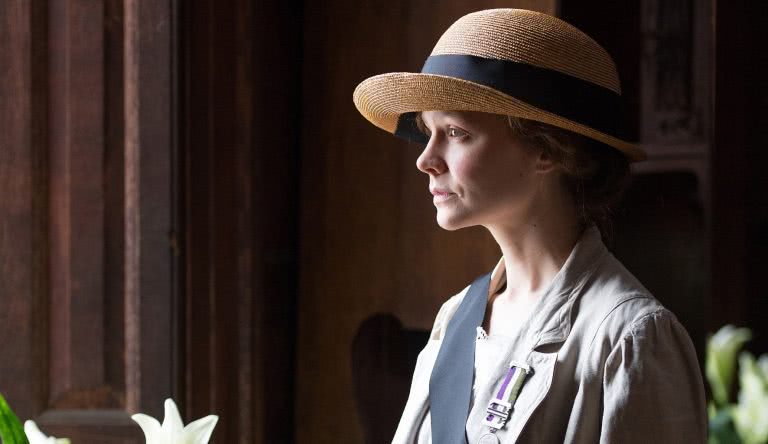In Sarah Gavron’s Suffragette, set during the early parts of last century, Carey Mulligan plays a fictitious London washerwoman who becomes involved in the struggle for women’s suffrage.
It’s a performance and a story that will no doubt strike a chord with modern audiences. On the one hand, it’s a tale of enormous historical importance in the fight for gender equality, one that has bizarrely gone untold on the big screen until now. But it’s also a story that feels very much of the present, reminding us of how much further the push for equality has to go.
“We still have so much more to do,” says women’s rights activist Dr. Helen Pankhurst. “I think the film can be part of the reminder of how hard-fought the rights we have gained have been, and how much more we still need to do. Look at issues such as political representation. Although Australia was one of the first countries to give women the vote, now it’s way down the list in terms of how many women are represented [in parliament]. So just because we achieve certain things in certain countries, complacency just cannot be an option.”
Splitting her time between Ethiopia and the UK, Pankhurst works as a senior adviser to CARE International, a humanitarian organisation that focuses primarily on empowering women in the developing world. She’s also the great-granddaughter of Emmeline Pankhurst, the leader of the British suffragette movement and one of the key figures in winning women the right to vote. It’s little wonder, then, that the producers of the film asked Helen to act as an informal consultant.
“It’s long overdue,” she says of the production. She too is baffled that it’s taken so much time for a film to be made about such a significant piece of history. “There was one series on the BBC in the ’70s,” she adds, referring to the six-part program Shoulder To Shoulder. “But apart from that, there’s been nothing on this scale. And yet it’s such a colourful, rich, interesting, powerful storyline. It’s bizarre, really, that it’s taken this long.”
When asked if she was ever worried the film might not live up to her expectations, Pankhurst says she was assured by the quality of Abi Morgan’s screenplay. “The minute I saw the script, that fear was laid to rest – there are so many things that in any storyline could be difficult, but I just thought that the balance had been really well held. And in particular, I really loved the fact that it was about the issues. How often do you have a film that manages to balance a grand political context with a personal story?”
The desire to combine the historic with the personal explains why Pankhurst’s ancestor is largely missing from the film, appearing in only a single (albeit memorable) scene played by the incomparable Meryl Streep. In this way, Emmeline becomes almost a mythical figure, agitating the authorities and inspiring courage and determination in her supporters.
“I loved the fact that they chose the story of a fictitious person who we could all identify with, rather than do a biopic of a particular person who you’d then be detached from,” says Pankhurst. She’s also full of praise for the cast, particularly Mulligan, who she describes as “just fantastic”.
Pankhurst is quick to point out how rare it is to have a film that is not only about women, but written, directed and produced by them as well. “To have a woman producer [Alison Owen and Faye Ward] and woman director, it’s an homage to the suffragettes and the women’s rights cause. And I hope that people actually go out and see it – I think it’s really important that audiences, if they like the idea of the film, go out and almost vote by being there and showing that we need more films of this kind.”
Beyond seeing the movie, Pankhurst also encourages everyone to support the work of organisations like CARE. “In Ethiopia, I work on issues such as water sanitation,” she says. “It’s a really basic one, because it tends to involve women and girls collecting water, and [there’s] poor sanitation, which then means that girls can’t go to school because there’s no latrine and no menstrual hygiene facilities. [We] also work on issues such as early enforced marriage, and changing girls’ attitudes about their options, but also working with the wider society in terms of changing social norms, and with government in terms of how they respond to all of these issues.
“I also work in the UK through things such as the Walk In Her Shoes campaign, which raises awareness of these issues in Ethiopia. CARE Australia does it as well, from March 8-14. It’s a week of fundraising and solidarity with women in developing countries, who still bear the burden of this level of poverty.”
Everyone, Pankhurst believes, has a role to play in the fight for equality. “What is nice and what is needed are people who have the confidence to say that, with any social inequality, wherever it is located, that they will be on the side of naming it and acting positively to address it. Not everybody is going to be a card-carrying feminist shouting from the rooftops, but I think more and more people are comfortable with saying, ‘Excuse me, but it’s obvious. It’s obvious that there’s a problem here.’”
Suffragetteopens in cinemas on Saturday December 26.

































